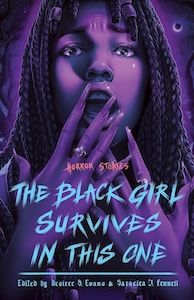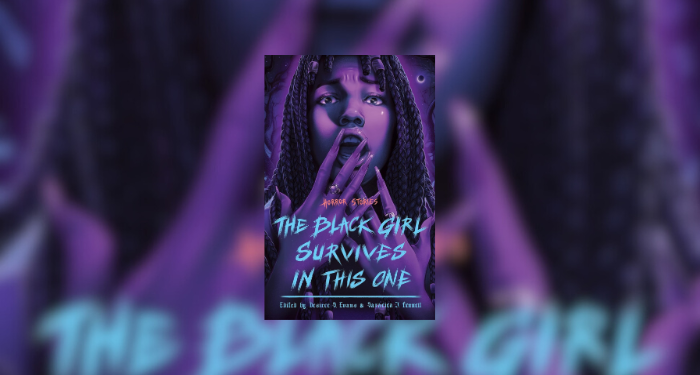
If you’ve read or watched even a little bit of horror, you’ve probably recognized that in far too many cases, Final Girl = white girl. Desiree S. Evans gives this harmful trope a long-overdue overhaul with The Black Girl Survives in This One, a new anthology of 15 YA stories that center Black girls as the heroes who beat the baddies, survive the horrors, and live to tell the tale.
Featuring stories by acclaimed writers like Zakiya Delilah Harris (The Other Black Girl), Monica Brashears (House of Cotton), Justina Ireland (Dread Nation) and an introduction from legendary horror writer Tananarive Due, The Black Girl Survives in This One celebrates voices that are challenging and changing what horror means. It’s available now wherever books and audiobooks are sold.
Here’s an excerpt of “The Brides of Devil’s Bayou” by Desiree S. Evans.
Aja dreams of broken girls.
Girls like the one sitting at the edge of her bed tonight. This girl is smiling at Aja, but the girl’s teeth are all missing, leaving a mouth full of bleeding gums and gaping holes. Aja wants to speak to the girl, to ask her who she is, but she can’t make a sound. She can only watch as the girl crawls closer, as her toothless grin widens.
Everything inside Aja is screaming to move, to run, to get away. With a count to three, she forces herself into motion, scrambling out of bed and tumbling onto the floor. When she looks up, she sees the girl moving toward her. This close, Aja notices how the girl’s face is a Halloween mask of bleeding scars and crusted wounds.
Aja opens her mouth, finally able to screech, “No!”
The girl reaches out a hand as if to help Aja up from the floor. “No,” Aja whimpers again.
“One!” the girl rasps out.
At that moment something grabs Aja from behind, and she screams until she blacks out.
When Aja wakes, she remembers where she is.
She sits up, gasping like she’s been underwater. It takes her a minute to relax enough to slow her breathing and to let her eyes adjust to the dark—she’s back home. Or what used to be home, a tiny shotgun house on the outskirts of Devil’s Bayou, Louisiana. It’s the first time Aja has been back since her daddy took her away when she was twelve.
Aja throws off her blanket and looks around her old childhood bedroom. It feels weird not to be back in her freshman dorm room at Sycamore College in North Texas with her snoring roommate, Chelsea, and her Tweety Bird alarm clock. Aja shakes off the sense of wrongness that sits deep in her belly, the way she feels foreign even though she’s back in familiar territory. Homesickness long ago settled in her spirit, a constant feeling of missing a part of her past she can’t ever get back.
Aja knows time doesn’t stand still. She’s no longer a child running through the swampy grove, chasing fireflies and mysteries. She’s eighteen now, an actual adult preparing to take on the world. Right? Yeah, right. Most days, Aja feels clumsy in her body, sloppy and unready for the tasks at hand. Like the task she now finds herself facing, having returned to Devil’s Bayou, the land of her mama’s kinfolk.
Two days ago, Aja took her last final exam of the semester, and then convinced her best friend, Letricia Moseley, to fly to Louisiana with her for the weekend. She and Letricia had arrived at the house earlier that evening, after driving two hours from the airport through winding, rural backroads. The plan is to celebrate Aja’s nineteenth birthday in two days here in her old hometown, heeding the advice of Aja’s therapist from the campus health center: Go to the source of your fear and let it go.
Aja still can’t believe it’s been seven years since her daddy had told her they were leaving this cursed bayou forever. They’d resettled out in Fort Worth, and he’d forbidden her to ever return. Told her that staying away was for her own good, that the town gossip and rumors wouldn’t follow her around anymore. But then the nightmares began a year ago, and the only thing Aja has been able to think about since is coming back to Devil’s Bayou.
Aja checks the time on her cell phone: 11:15 p.m. She’d slept for three hours, which for her is a pretty good run, considering her insomnia. Glancing at her phone’s lit screen, she notices another missed call from her daddy. She swallows back her guilt. She hadn’t told him about this trip, knowing he’d be upset. In fact, she’d been ignoring his calls for the past three days, shooting off quick texts of I’m fine! and Exams are killing me!
Aja climbs out of bed and winds her way through the dark house before stepping outside onto the porch. She takes in the wild expanse of her family’s land. The quarter moon sits huge and heavy in the sky beyond the bayou’s bend, and the trees in the yard—full of moonlight and shadows—cocoon the house on all sides. Aja can’t believe her ancestors had lived out here alone for generations. That Memaw Abbigail had died out here alone, too, nearly two years ago.
Needless to say, then, Aja is shocked when she turns to see the old woman seated in her favorite porch rocking chair, as if she’d been waiting for her.
“I’m still dreaming, ain’t I?” Aja breathes out, the realization making her dizzy.
Memaw Abbigail chuckles, rocking away. She looks much like she did the last time Aja had seen her seven years ago. Thin and regal, with light brown skin and a head full of kinky silver hair. Her face, even in old age, had always been soft with few lines, giving her an ageless appearance.
“It come for you,” Memaw Abbigail says to Aja, her voice rough but familiar.
“Memaw, stop with the ghost stories.” Aja sighs, exhausted by the old tales and superstitions, the very reasons her daddy had taken her away in the first place. She turns from her grandmother and gazes out at the tangled yard, at the blue glass bottles that dangle from the branches of the oak tree out front. Like the witch knots that hang from the porch ceiling, the bottles are meant to trap evil spirits that make it across the bayou. Memaw Abbigail’s old-time beliefs fill so many of Aja’s childhood memories of home.
“Now that you a woman, that demon gonna come for you,” Memaw Abbigail says again, gazing out at the darkness. “Gonna make you its bride.”
“I ain’t being no demon bride, Memaw!” Aja huffs, shaking her head.
Even here in Aja’s dreams, her memaw is stubborn in her belief in their old family legend. Its origin story is one Aja heard throughout her childhood. Her ancestor, a young enslaved girl named Mosi, made a pact with a demon she’d summoned out in Devil’s Bayou. In exchange for freedom and safety, the girl had promised the demon five generations of her bloodline’s eldest daughters.
“Cara. Margaret. Anna. Catherine.” Aja whispers the names of the four young women in the family who had vanished into the swamp on their nineteenth birthdays. Never to be seen again. According to the story, Aja should be next, as the eldest daughter of the fifth generation descended from Mosi. Growing up, everyone in town would whisper about Aja’s inevitable fate, about how she was the last of the cursed girls, the final bride promised to the demon of Devil’s Bayou.
This piece of family folklore used to scare Aja more than anything in the world, but her therapist had told her these stories were just a way her family had tried to make sense of the horrible things that had happened to them.
“It’s how we try to understand tragedy,” Aja repeats aloud, into the quiet of her dream. “This swamp is full of natural dangers. Those girls either got hurt in the swamp, ran away, or killed themselves. No reason to blame a monster.”
Wary of the family’s influence on her, Aja’s daddy even forbade her from attending her memaw’s funeral two years ago. Now all Aja has left of her memaw is the crumbling, empty house she’d inherited from her. And these dreams.
Silence for a long time, and then Memaw Abbigail asks, “What do you dream about?”
Aja chuckles softly. A dream asking about a dream—how fitting. Yet it’s true that all her dreams these days are like this one—murky, strange.
“What do you see?” her memaw continues.
“You. This house,” Aja whispers, recalling her dreams of late. “Snakes swarming me.” Her dreams are often filled with slithering things creeping and crawling across her body in the nightmare dark. Two weeks ago she’d begun to see the broken girls, but tonight was the first time one actually spoke to her.
“It’s calling to you.” Memaw Abbigail’s voice echoes in the night. Then: “Find the bone. Send it home.”
Before Aja can even process her memaw’s last cryptic words, she sees a disturbance in the overgrown front yard. Something glistening in the moonlight, rising up from the tall grass. It takes Aja a moment to understand what she sees.
A teenage girl silhouetted against the night sky. She climbs out of the ground, her white dress mud ravaged and bloody. Her dripping, tangled hair is plastered across her face. The girl has no eyes.
Aja watches in horror as two long snakes slither out of the girl’s empty eye sockets, circling around her neck like a noose just before the girl collapses back to the ground. Down in the grass, the girl croaks out one wet, phlegmy word: “Two.”
“Hell nah,” Aja says, backing away slowly. “You’re not real. I’m still dreaming.” She wills herself to believe this as the girl begins crawling forward through the grass, her eyeless face grinning, ghastly.
Wakeupwakeupwakeup! Aja tells herself.
From inside the house, the family’s old grandfather clock chimes five times.
Aja wakes to predawn shadows crossing the empty porch and emptier yard. She knows the dream is over, but her memaw’s strange words linger.
Find the bone. Send it home.
“THE BRIDES OF DEVIL’S BAYOU” EXCERPTED FROM THE BLACK GIRL SURVIVES IN THIS ONE. COPYRIGHT © 2024 BY DESIREE S. EVANS. EXCERPTED BY PERMISSION OF FLATIRON BOOKS, A DIVISION OF MACMILLAN PUBLISHERS. NO PART OF THIS EXCERPT MAY BE REPRODUCED OR REPRINTED WITHOUT PERMISSION IN WRITING FROM THE PUBLISHER.
